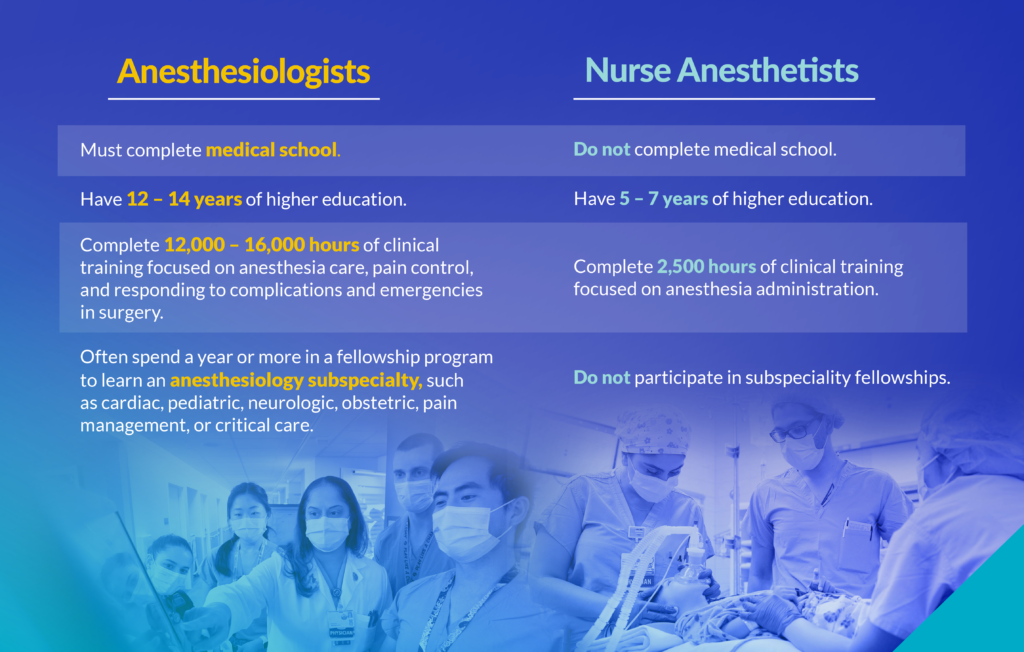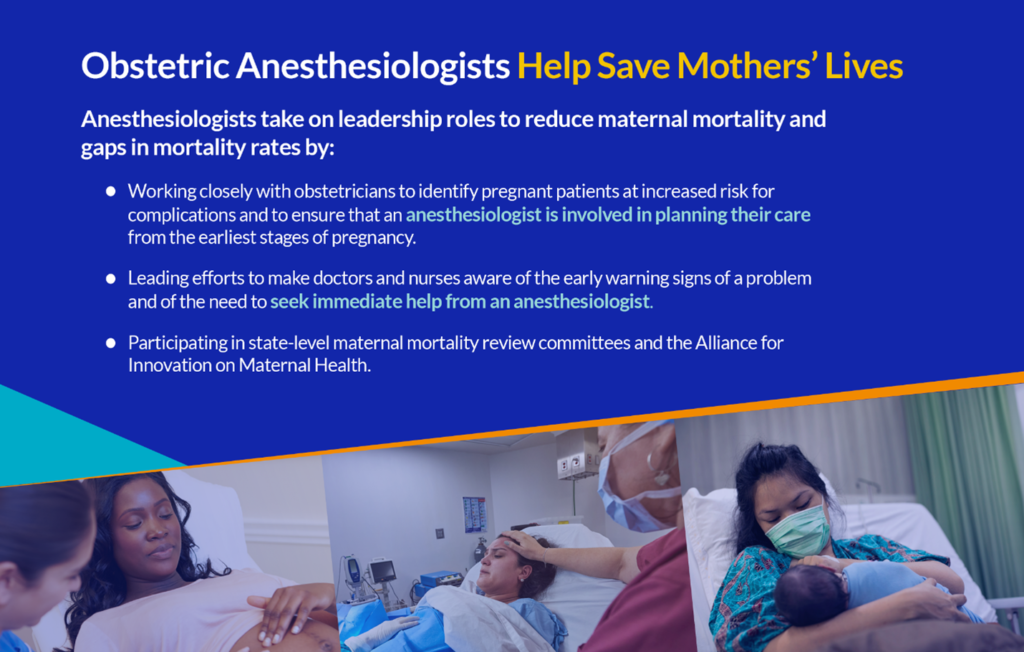The Importance of Physician-Led Anesthesia Care
As medical doctors and leaders of the Anesthesia Care Team, anesthesiologists ensure the safest and best outcomes for all patients. That’s why laws in most states and the policies of the nation’s top hospitals require physician-led anesthesia care. Removing anesthesiologists from care raises risks for patients without expanding health care access or reducing costs. Don’t jeopardize your constituents. Preserve physician-led anesthesia care.

Leading care with unmatched expertise
Anesthesiologists value all anesthesia providers and the teamwork that goes into providing patients with the highest-quality care. They evaluate, monitor, and supervise patients before, during, and after surgery and lead the Anesthesia Care Team to ensure optimal patient safety. Nurses and other nonphysician practitioners are trained primarily to administer anesthesia, not to make critical decisions during surgery. Anesthesiologists’ extensive education and training have prepared them to make those crucial choices that can mean the difference between life and death.

Lowering risks, saving lives, and enhancing recovery
Anesthesiologists apply their expertise to:
- Identify and mitigate patient risks before surgery.
- Prevent complications and respond to emergencies in the operating room.
- Enhance their patients’ postoperative recovery.
Nine in 10 patients want an anesthesiologist by their side to keep them safe in surgery.
Independent survey conducted by PSB for the American Society of Anesthesiologists
Get the Facts:
Many studies prove the benefits of anesthesiologist-led care.


Providing high-quality care and reducing costs
Anesthesiologists’ services are reimbursed by Medicare, Medicaid, and most third-party insurers at the same rate as services provided by nurse anesthetists. But anesthesiologists’ involvement and leadership play a critical role in controlling health care costs before, during, and after surgery by:
- Reducing unnecessary testing, same-day cancellations, operating room emergencies, and surgical complications.
- Decreasing the need for additional consults from other specialty physicians for services that could have been provided by an anesthesiologist.
- Reducing the risk of costly hospitalization following outpatient surgery.
Surgical care costs were about 8.7%—or $1,800—higher per inpatient surgery in states that allowed nurse-only anesthesia care to replace physician-led care.
Based on a 2017 study of states that allow nurse-only anesthesia care for Medicare patients.
The Dangers of Medical Title Misappropriation
Anesthesiologists are medical doctors. Nurses are not. That’s why the use of titles such as “nurse anesthesiologist” is dangerously misleading. Medical title misappropriation removes the transparency in health care that patients deserve—denying them the opportunity to make fully informed choices for themselves and their loved ones.
Keep health care honest. The term “anesthesiologist” has always referred to physicians who are extensively trained in the science and practice of anesthesiology. The American Medical Association, the American Board of Anesthesiology, and the American Board of Medical Specialties affirm that anesthesiology is a medical specialty and that professionals who refer to themselves as “anesthesiologists” must hold a license to practice medicine.
“To use the term ‘anesthesiologist’ incorrectly will confuse patients and violate the universally accepted ethical principle in health care that patients must have full knowledge and understanding of who the professionals are that are providing their care.”
— Beverly K. Philip, MD, Professor of Anesthesia at Harvard Medical School
Improved Health and Access to High-Quality Care for All Patients
Denying any group of patients access to anesthesiologists—including residents of rural areas, historically marginalized racial groups, people with low incomes, older adults, and Veterans—subjects them to greater risk in surgery and a higher likelihood of poor medical outcomes. Anesthesiologists are leaders who use their expertise to address inequities in health care and protect these higher-risk patient groups. Removing requirements for physician-led Anesthesia Care Teams will only worsen health care disparities.
See the Research:
Replacing an anesthesiologist with a nurse is dangerous and counterproductive—worsening patient outcomes without increasing access to care. Read the research.
Close gaps in maternal mortality. Maternal mortality rates are higher among low-income populations and historically marginalized racial and ethnic populations, especially among Black women. Obstetric anesthesiologists help reduce this disparity by working to prevent maternal deaths from cardiovascular disease, embolic disease, preeclampsia, postpartum hemorrhage, sepsis, and other conditions.

Ways To Protect Your Constituents
Protect your constituents and preserve physician-led care by opposing legislation that removes anesthesiologists from anesthesia care in your state. Take these three easy steps to get started.
- Equip yourself with facts and firsthand accounts about the ways in which anesthesiologists ensure patient safety.
- Learn how anesthesiologists improve patient outcomes, reduce medical costs, and provide access to high-quality health care.
- Contact us to get in touch with an anesthesiologist in your constituency.
Contact Us
Contact Us
